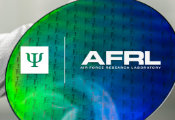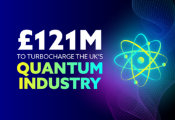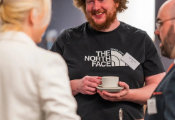Quantum Space Sensor to Fight Climate Change
Quantum Space Sensor to Fight Climate Change
An new project, launched by the European Commission and supported by the Quantum Flagship, is set to transform the way in which Earth monitoring is conducted by providing more accurate data on changes in ice melt, groundwater depletion, and ocean circulation. CARIOQA-PMP is a new €17 million project that seeks to improve traditional gravity-sensing methods by incorporating the capabilities of quantum sensors.
New Roadmap To Position Europe As the ‘Quantum Valley’ of the World
New Roadmap To Position Europe As the ‘Quantum Valley’ of the World
Quantum Flagship unveils new roadmap with calls to end reliance on outside nations for developing essential components and hardware and position Europe as the world’s first ‘Quantum Valley’.
Quantum experts met policymakers and representatives at the European Commission in Brussels today to present the new Strategic Research and Industry Agenda SRIA 2030: Roadmap and Quantum Ambitions over this Decade.
Project SPINUS Reaches Milestones Towards Scalable Solid-State Quantum Computing
Project SPINUS Reaches Milestones Towards Scalable Solid-State Quantum Computing
Advancing scalable solid-state quantum computing from materials to quantum processors and simulators—this is the ambitious project goal of the joint European project SPINUS. During their annual meeting, which took place in February in Trento, Italy, the project partners gathered to assess their latest scientific achievements and to align on strategic objectives for the upcoming project phases. During two days of intensive discussions, including a quantum technologies networking session with external participants, the consortium showcased decisive milestones and lived up to SPINUS’ role in advancing European quantum research.
Quantum Technologies Consolidate Their Presence at the Mobile World Congress 2025
Quantum Technologies Consolidate Their Presence at the Mobile World Congress 2025
This year, MWC25 will host the Quantum Europe stand. Curated by ICFO and located in Hall 6 - Stand 6A8, the stand will feature the latest achievements and advances accomplished so far by some of the companies and initiatives that comprise the Quantum Flagship. Quantum devices and technologies that cover areas such as quantum-encrypted ultra-safe communications on ground and in space, the future quantum internet, quantum simulation and computing, will be showcased by the different entities at the stand to provide an overview of the current status of maturity of these technologies to the MWC audience that is interested in cybersecurity, telecommunications, artificial intelligence, connectivity, finance, healthcare, reliability and agility in secure communications, among others.
New Chip to Solve Quantum Computing Roadblocks
New Chip to Solve Quantum Computing Roadblocks
The European Commission invests €3 million to develop first-ever quantum chip that combines electronics and light using advanced Germanium-Silicon technology. The goal is to make quantum computers faster, more efficient, and scalable, enabling them to tackle challenges like drug discovery, cybersecurity, and AI. The project consortium unites leading institutions from across Europe to drive technological independence and quantum innovation.
European Scientists Are Using Diamonds to Build a New Quantum Computer
European Scientists Are Using Diamonds to Build a New Quantum Computer
European scientists are using diamonds to build a new quantum computer that works without needing to be cooled to ultra-low temperatures. This technological approach promises to make quantum computers more practical and scalable, leading, for example, to faster development of life-saving drugs and more powerful optimisation algorithms in the finance sector.
€10M Project Eyes 100 Qubit Diamond Quantum Computer
€10M Project Eyes 100 Qubit Diamond Quantum Computer
A €10m consortium funded by the European Commission and supported by the Quantum Flagship is using diamond and silicon carbide to build quantum computers and quantum simulators that can run at room temperature. The SPINUS project is developing quantum simulators with more than 50 qubits and quantum computers with over ten qubits, the team expects that their research will provide a strategy to scale up to over 1000 and 100 qubits, respectively, within five years post-project.
Quobly Wins €2.5 Million EIC Grant to Develop FD-SOI Quantum Processor Demonstrator
Quobly Wins €2.5 Million EIC Grant to Develop FD-SOI Quantum Processor Demonstrator
The European Innovation Council has approved €2.5 million in EIC Transition funding for Quobly for its MCSQUARE project to build an FD-SOI quantum processor demonstrator.
Researchers Develop the First Photon Pair Quantum Source Based on a Silicon Core Fiber Platform
Researchers Develop the First Photon Pair Quantum Source Based on a Silicon Core Fiber Platform
A team of researchers from ICFO and the Royal Institute of Technology (KTH) from Sweden reports on APL Photonics the first demonstration of a photon pair source based on a silicon core fiber. The novel platform offers a unique combination of low propagation losses, high nonlinearity and compactness making it a promising candidate for scalable quantum applications.
The Ariane 6 Carrier Rocket, Equipped With the Advanced Diamond Quantum Magnetometer, Has Been Successfully Launched
The European Quantum Flagship Initiative announced that the Ariane 6 carrier rocket was successfully launched a few days ago, carrying the advanced Diamond Quantum Magnetometer developed by its project AMADEUS, which can detect magnetic fields with incredible sensitivity. This device, named Oscar-Qube Plus, is a miniature quantum magnetic field sensor. Its first-generation version was launched to the International Space Station in August 2021 for scientific research.


























